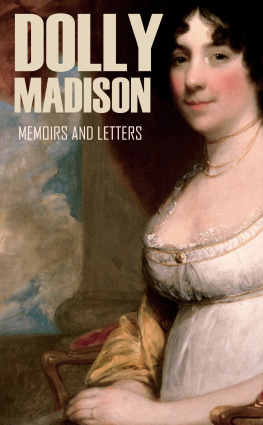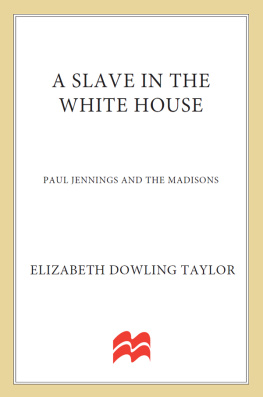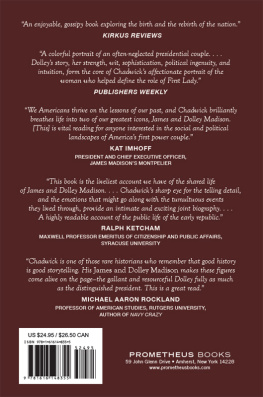ALSO BY CATHERINE ALLGOR
Parlor Politics:
In Which the Ladies of Washington
Help Build a City and a Government
A
PERFECT
UNION
A
PERFECT
UNION
DOLLEY MADISON AND THE CREATION
OF THE AMERICAN NATION
CATHERINE ALLGOR


Henry Holt and Company, LLC
Publishers since 1866
175 Fifth Avenue
New York, New York 10010
www.henryholt.com
Henry Holtand are registered trademarks ofHenry Holt and Company, LLC.
are registered trademarks ofHenry Holt and Company, LLC.
Copyright 2006 by Catherine Allgor
All rights reserved.
Part of chapter 11 previously appeared in Establishing Congress: The Removal to Washington, D. C., and the Election of1800, ed. Kenneth R. Bowling and Donald R. Kennon (Athens: Ohio University Press, 2005) and is used here with the kind permission of the editors.
Distributed in Canada by H. B. Fenn and Company Ltd.
Library of Congress Cataloging-in-Publication Data
Allgor, Catherine, [date]
A perfect union : Dolley Madison and the creation of the American nation / Catherine
Allgor.1st ed.
p. cm.
Includes bibliographical references.
ISBN-13: 978-0-8050-7327-0
ISBN-10: 0-8050-7327-2
1. Madison, Dolley, 17681849. 2. Madison, Dolley, 17681849Political and social views. 3. Presidents spousesUnited StatesBiography. 4. United StatesPolitics and government17831865. I. Title.
E342.1.M2A45 2006
973.51092dc22
[B] 2005055127
Henry Holt books are available for special promotions and premiums.
For details contact: Director, Special Markets.
First Edition 2006
Designed by Meryl Sussman Levavi
Printed in the United States ofAmerica
1 3 5 7 9 10 8 6 4 2
To Gianna C. Gifford and Sarah K. Hagan,
women who made history on June 13, 2004
Contents
A
PERFECT
UNION
A Note on Names
Some readers will notice that I have not observed the convention of referring to my subject primarily by her last name. At any given point in the narrative, Dolley Madison could be a Payne, a Todd, or a Madison, therefore Dolley is the choice for the leading lady of this story. To refer to James Madison as Madison replicates outdated biographical forms in which men are given the respect of last names and women are relegated to informal designations.
The final choice here is a blend of the old and the new. When a man stands alone in the text, he is referred to by his full name or his last. Likewise, a woman who appears on her own will be identified by her full name, e.g. Margaret Bayard Smith, at least at first mention. When discussing men and women in political partnerships, both will be referred to by first names; hence, the Madisons will be James and Dolley. If this seems excessively familiar to modern readers, at least both women and men will suffer any diminishment equally.
Prologue
O n Wednesday, August 24, 1814, Dolley Madison stood at the window of the White House and watched thousands of Washingtonians, rich and poor, white and black, pouring down Pennsylvania Avenue. News and rumors of the approach of British troops had thrown the city into confusion, and the population had been evacuating for days. Vehicles were at a premium, and any conveyance with wheels was pressed into service by the fleeing throngs. It had not rained for three weeks, and the clouds of dust raised by the people, horses, carriages, and carts lingered ominously on the horizon.
With chaos at her door, Dolley sat down at her desk to continue a letter to her sister Lucy, which she had begun the previous day. My husband left me yesterday morng to join General Winder, Dolley had written on Tuesday. He enquired anxiously whether I had courage, or
By midday on Wednesday, Dolley had packed, press[ing] as many cabinet papers into trunks as to fill one carriage; our private property must be sacrificed, but she was also determined to wait for her husband. From time to time, she went onto the roof of the executive mansion, anxiously casting her spyglass in every direction. By this point, 90 percent of the populace had fled, even the men guarding the city. The mayor of Washington, James H. Blake, came twice to plead with her to evacuate, but Dolley would not leave until James returned.
This disastrous state of affairsthe capital city under threat and the president in physical jeopardyhad taken Americans by surprise. Though there certainly had been signs that the British were targeting Washington, the country had for the most part denied the danger. As recently as early August, Dolley had assured her own son that the British on our shores are stealing & destroying private property, rarely comeing to battle but when they do, are allways beaten, yet the truth was far less rosy. Over the course of the two-year war with Great Britain, victories on the American side had been few, and the losses significant and frustrating. American troops had repeatedly tried to invade Canada, across the Niagara frontier, from Lake Champlain toward
Dolley feared not only marauding British soldiers but also nearer enemies. Mr. Madisons War, as his detractors dubbed it, had divided the country, inflaming an already combustible political climate. Treachery filled the air, and on the eve of invasion Dolley had American foes in mind when she darkly hinted to her sister: Disaffection stalks around us. Indeed, she wanted to leave the city with James as much for his safety as her own: I hear of much hostility towards him.
Even as she was deciding whether she should wait for the president, Dolley was overseeing the preparations for that days dinner party, supervising the table setting for forty guests, ordering the wines, ale, and cider to be brought from the cellar. This occasion was one of many she had hosted in the past months, designed to reassure government officials and local gentry alike that all was well. By three oclock, however, she received word of a devastating rout near Bladensburg, Maryland, during which the Americans turned tail and ran so quickly that the episode would come to be known as the Bladensburg Races.
Now within sound of the cannon, Dolley lived a lifetime, waiting for her husband to return, but Mr. Madison comes not; may God protect him! She was in an agony of fear that the British would take James prisoner. Urged on by friends, she organized herself and her slaves to leave the house. Charles Carroll, a wealthy Maryland landowner and Madison supporter has come to hasten my departure, and is in a very bad humor with me because I insist on waiting until the large picture of Gen. Washington is secured. The full-length portrait of the beloved Washington
Dolleys departure could not be much longer delayed. James Smith, a free black man who had accompanied the president to Bladensburg, came galloping down the street, warning Dolley and the remaining capital residents to flee, as the American forces were in retreat. Clearly, James would not come now; if Dolley lingered any longer, she risked capture as a political prisoner or death as a casualty of war. It was time to end her missive. And now, dear sister, I must leave this house, or the retreating army will make me a prisoner in it, by filling up the road I am directed to take. When I shall again write you, or where I shall be tomorrow, I cannot tell!!
That day the British did indeed invade Washington City. They looted and burned only the public buildings, taking particular relish in consigning the presidents palace to the flames. Before they did so, however, they sat down and enjoyed the elegant meal that had been set out. Given the effort Dolley Madison had put into establishing her White House as the capitals social and political center, it seems fitting that a dinner party, even one attended by uninvited guests, occupied the last moments of the executive mansion.
Next page









 are registered trademarks ofHenry Holt and Company, LLC.
are registered trademarks ofHenry Holt and Company, LLC.